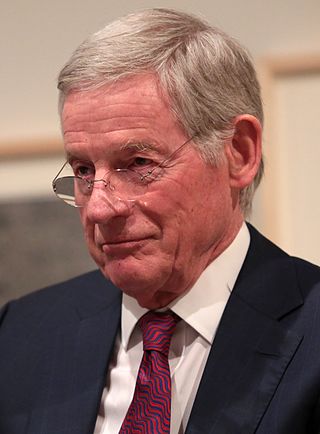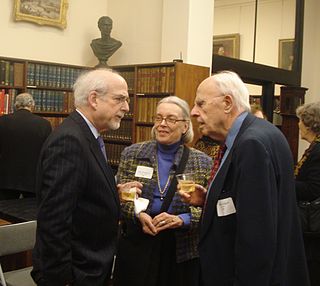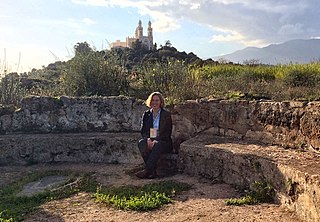Related Research Articles
Bernard Wasserstein is a British and American historian.
George Paul Landow was Professor of English and Art History Emeritus at Brown University. He was a leading authority on Victorian literature, art, and culture, as well as a pioneer in criticism and theory of Electronic literature, hypertext and hypermedia. He also pioneered the use of hypertext and the web in higher education.

Harvey Claflin Mansfield Jr. is an American political philosopher. He was the William R. Kenan Jr. Professor of Government at Harvard University, where taught from 1962 until his retirement in 2023. He has held Guggenheim and NEH Fellowships and has been a Fellow at the National Humanities Center. In 2004, he was awarded the National Humanities Medal by President George W. Bush and delivered the Jefferson Lecture in 2007.

Rebecca Newberger Goldstein is an American philosopher, novelist, and public intellectual. She has written ten books, both fiction and non-fiction. She holds a Ph.D. in philosophy of science from Princeton University, and is sometimes grouped with novelists such as Richard Powers and Alan Lightman, who create fiction that is knowledgeable of, and sympathetic toward, science.
Raymond F. Hopkins is an American political science professor and expert on food politics and food policy. Hopkins taught at Swarthmore College from 1967 until his retirement in 2007, where he was the Richter Professor of Political Science.
Alexander Rabinowitch is an American historian. He is Professor Emeritus of History at the Indiana University Bloomington, where he taught from 1968 until 1999, and Affiliated Research Scholar at the St. Petersburg Institute of History, Russian Academy of Sciences, since 2013. He is recognized internationally as a leading expert on the Bolsheviks, the Russian Revolution of 1917, and the Russian Civil War.

Bruce Milan Cole was a longtime professor of art history at Indiana University, a Senior Fellow at the Ethics and Public Policy Center in Washington, D.C., a member of the Eisenhower Memorial Commission, and the eighth Chair of the National Endowment for the Humanities.

Awadh Kishore Narain was an Indian historian, numismatist and archaeologist, who published and lectured extensively on the subjects related to South and Central Asia. He was well known for his book, The Indo-Greeks, published by Clarendon Press in 1957, in which he discussed the thesis of British historian Sir William Woodthorpe Tarn.
Seth Lerer is an American scholar and Professor of English. He specializes in historical analyses of the English language, and in addition to critical analyses of the works of several authors, particularly Geoffrey Chaucer. He is a Distinguished Professor Emeritus of Literature at the University of California, San Diego, where he served as the Dean of Arts and Humanities from 2009 to 2014. He previously held the Avalon Foundation Professorship in Humanities at Stanford University. Lerer won the 2010 Truman Capote Award for Literary Criticism and the 2009 National Book Critics Circle Award in Criticism for Children’s Literature: A Readers’ History from Aesop to Harry Potter.

Louis Harry Feldman was an American professor of classics and literature. He was the Abraham Wouk Family Professor of Classics and Literature at Yeshiva University, the institution at which he taught since 1955.
The Department of Central Eurasian Studies, often abbreviated as CEUS, is a specialized academic department in the Hamilton Lugar School of Global and International Studies, at the Bloomington campus of Indiana University, in Bloomington, Indiana. Since its original formation in 1943 as a language-training program for the U.S. military, the department has become the sole independent degree-granting academic unit staffed with its own faculty dedicated to Central Eurasia in the country. Due to the department and the presence of several additional centers - the Inner Asian & Uralic National Resource Center, the Denis Sinor Research Institute for Inner Asian Studies, and the Center for Languages of the Central Asian Region - Indiana University currently hosts the premier program of Central Asian studies in the United States.

Alison Hawthorne Deming is an American poet, essayist and teacher, former Agnese Nelms Haury Chair in Environment and Social Justice and currently Regents Professor Emerita in Creative Writing at the University of Arizona. She received a 2015 Guggenheim Fellowship.
Neil Foley is an American historian.
Joanne Meyerowitz is an American historian and author. She was a professor at Indiana University and the University of Cincinnati before becoming editor of the Journal of American History from 1999 to 2004. Following her tenure there, she accepted a position at Yale University, where she was subsequently appointed the Arthur Unobskey Professor of History. Her work has appeared in the American Historical Review, Gender & History, the Journal of Women's History, and the Bulletin of the History of Medicine.
Carter Vaughn Findley is a Humanities Distinguished Professor in the History Department at Ohio State University, where he teaches the history of Islamic civilization, with emphasis on the Ottoman Empire and the modern Middle East. He is the author of several published books and more than thirty scholarly articles in English, French, and Turkish.
Zsuzsanna Gulácsi is a Hungarian-born American historian, art historian of pan-Asiatic religions. She is a professor of art history, Asian studies, and comparative religious studies at Northern Arizona University (NAU). Her teaching covers Early and Eastern Christian art, Islamic art, with special attention to the medium of the illuminated book; as well as late ancient and mediaeval Buddhist art from South, Central, and East Asia.

Catherine Mary Conybeare is an academic and philologist and an authority on Augustine of Hippo. She is currently Leslie Clark Professor in the Humanities at Bryn Mawr College in Pennsylvania.
Helen Florence North (1922-2012) was an American classical scholar and an expert on Greek and Roman literature.
Adeeb Khalid is associate professor and Jane and Raphael Bernstein Professor of Asian Studies and History in the history department of Carleton College in Northfield, Minnesota. His academic contributions are highly cited.
Neil Harris is an American cultural historian. He is the Preston and Sterling Morton Professor of History and Art History Emeritus at the University of Chicago.
References
- ↑ "Jamsheed Choksy – Department of Religious Studies". indiana.edu. Retrieved 2020-02-24.
- 1 2 "Jamsheed K. Choksy | The Huffington Post". www.huffingtonpost.com. Retrieved 2017-02-06.
- 1 2 "Honoree: Search Awards: University Honors & Awards: Indiana University". honorsandawards.iu.edu. Retrieved 2017-02-06.[ permanent dead link ]
- ↑ "Six Scholars Join the National Council on the Humanities". The National Endowment for the Humanities. Retrieved 2021-06-24.
- ↑ "Indian named for Humanities Council". Hindustan Times. 2008-01-04. Retrieved 2021-06-24.
- ↑ "Jamsheed Choksy: Current Faculty: People: Central Eurasian Studies: Indiana University". Central Eurasian Studies. Retrieved 2021-06-24.